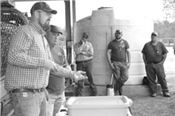|
AgCenter School Teaches Artificial Insemination

LSU AgCenter extension agents Lee Faulk and Vincent Deshotel demonstrate how to store and handle cattle semen to increase efficiency
and efficacy in an artificial insemination program. Hands-on demonstrations and workshops were held each day during the LSU AgCenter artificial
insemination school held at Nov. 6-8 at the Dean Lee Research and Extension Center in Alexandria.
Photo by Karol Osborne/LSU AgCenter
ALEXANDRIA, LA.
For cattle producers, artificial insemination (AI) is an affordable way to introduce desirable genetics to a herd and improve herd management, especially for smaller commercial and farm operations.
“Better genetics increases profits by reducing production costs and producing better calves with improved trait selection, like fertility and productivity, with greater quality of product,” said LSU AgCenter beef cattle researcher Guillermo Scaglia.
Scaglia and a team of AgCenter experts led a three-day artificial insemination school Nov. 6-8 at the LSU AgCenter Dean Lee Research and Extension Center in Alexandria, where 15 cattle producers learned the science and techniques needed to successfully improve the quality of their herds.
The class covered topics on anatomy, nutrition, reproductive management, body condition scoring and herd health while providing hands-on instruction in the care and handling of equipment, facilities and AI procedures with live cows.
“The whole experience, all of the information they are giving us and the hands-on AI, is really helpful,” said Allen Bourgeois, a small herd operator from St. Martinville.
“I can actually AI breed my own cattle and not depend on other people,” he said.
The beef cattle industry contributed more than $465 million to the Louisiana economy in 2018, and another $77.5 million was generated by the state’s dairy industry, according to the LSU AgCenter Louisiana Summary of Agriculture and Natural Resources.
More than 11,000 cattle and dairy producers operate in the state.
The intensive three-day course examined many issues that producers should consider before beginning an artificial insemination program.
“Cattle producers need to plan for end goals,” Scaglia said, adding that selecting for one specific genetic trait will affect other traits, so a balanced approach is recommended.
A well-planned AI program can help producers reduce costs by requiring fewer bulls, yielding females who can deliver more calves in their lifetime and be bred earlier in their lives, improving weaning weights of calves, or introducing improved carcass traits in steers, Scaglia said.
By concentrating the calving season to ensure calves will be born fairly close together, producers can improve herd management and help the females recover more easily for the next breeding season, he said.
Small-herd owners aiming to improve genetics will see a benefit on the first progeny, he said, although it will take two or more generations to see most of the herd positively affected.
“I’m in the position now where I kept heifers from my bull, and I can’t rebreed to that bull, so I need to continue that line with outside bulls without having to buy the bull,” said Avoyelles Parish producer Sherwood Poret.
Tim Fontenot, a Louisiana Master Cattleman from St. Landry Parish, said the hands-on experience was the most valuable aspect of the program for his commercial beef operation.
“Until you get out here and do it, it is totally different and a challenge,” he said. “The only way you are going to do it is practice.”
For Jesse and Misty Thibodeaux, the class helped them learn how to improve the commercial dairy cows that their two oldest daughters show as part of the 4-H program in Jefferson Davis Parish.
The biology has definitely been helpful, and the hands-on instruction made this class worthwhile, they said, adding that the program was a “golden” opportunity for them.
DeSoto Parish cattle producer Michael Rister said he is looking for some good carcass and weaning traits to potentially market straight to larger beef programs in the future.
“The hands-on anatomy is the biggest part of it, and that’s the part you can’t learn on YouTube,” Rister said.
The next AgCenter artificial insemination class is planned in spring 2020 and will be held at the LSU AgCenter Hill Farm Research Station in Homer.
For registration information, contact AgCenter extension agents Jason Holmes at jholmes@agcenter.lsu.edu or 318-368-9935, or Lee Faulk at afaulk@agcenter.lsu.edu or 318-927-2578.
Scaglia can be contacted at gscaglia@agcenter.lsu.edu or 337-276-5527. ∆
|
|